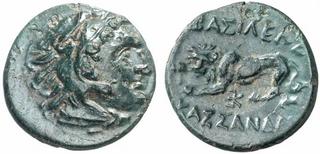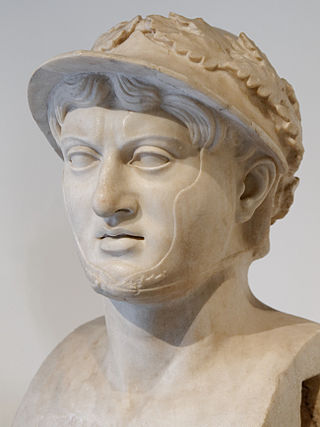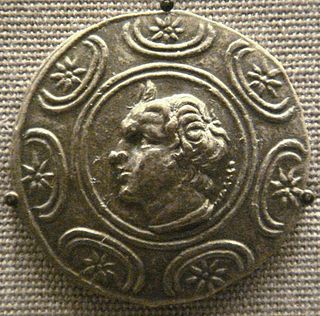Related Research Articles

The Antigonid dynasty was a Macedonian Greek royal house which ruled the kingdom of Macedon during the Hellenistic period. Founded by Antigonus I Monophthalmus, a general and successor of Alexander the Great, the dynasty first came to power after the Battle of Salamis in 306 BC and ruled much of Hellenistic Greece from 294 until their defeat at the Battle of Pydna in 168 BC, after which Macedon came under the control of the Roman Republic.
This article concerns the period 319 BC – 310 BC.

This article concerns the period 309 BC – 300 BC.
During the 290s BC, Hellenistic civilization begins its emergence throughout the successor states of the former Argead Macedonian Empire of Alexander the Great, resulting in the diffusion of Greek culture throughout the Levant and advances in science, mathematics, philosophy, etc. Meanwhile, the Roman Republic is embroiled in war against the Samnites, the Mauryan Empire continues to thrive in Ancient India, and the Kingdom of Qin in Ancient China, the one which in the future will conquer its adversaries and unite China, begins to emerge as a significant power during the Warring States period.
This article concerns the period 289 BC – 280 BC.
Year 313 BC was a year of the pre-Julian Roman calendar. At the time, it was known as the Year of the Consulship of Cursor and Brutus. The denomination 313 BC for this year has been used since the early medieval period, when the Anno Domini calendar era became the prevalent method in Europe for naming years.
Year 311 BC was a year of the pre-Julian Roman calendar. At the time, it was known as the Year of the Consulship of Brutus and Barbula. The denomination 311 BC for this year has been used since the early medieval period, when the Anno Domini calendar era became the prevalent method in Europe for naming years.
Year 301 BC was a year of the pre-Julian Roman calendar. At the time, it was known as the Year of the Dictatorship of Corvus. The denomination 301 BC for this year has been used since the early medieval period, when the Anno Domini calendar era became the prevalent method in Europe for naming years.
Year 286 BC was a year of the pre-Julian Roman calendar. At the time it was known as the Year of the Consulship of Corvus and Paetus. The denomination 286 BC for this year has been used since the early medieval period, when the Anno Domini calendar era became the prevalent method in Europe for naming years.

Demetrius I Poliorcetes was a Macedonian Greek nobleman and military leader who became king of Asia between 306 – 301 BC and king of Macedon between 294–288 BC. A member of the Antigonid dynasty, he was the son of its founder, Antigonus I Monophthalmus and his wife Stratonice, as well as the first member of the family to rule Macedon in Hellenistic Greece.

Seleucus I Nicator was a Macedonian Greek general, officer and successor of Alexander the Great who went on to found the eponymous Seleucid Empire, led by the Seleucid dynasty. Initially a secondary player in the power struggles following Alexander's death, Seleucus rose to become the total ruler of Asia Minor, Syria, Mesopotamia, and the Iranian plateau, assuming the title of basileus (king). The Seleucid Empire was one of the major powers of the Hellenistic world, until it was overcome by the Roman Republic and Parthian Empire in the late second and early first centuries BC.

Antigonus I Monophthalmus was a Macedonian Greek general and successor of Alexander the Great. A prominent military leader in Alexander's army, he went on to control large parts of Alexander's former empire. He assumed the title of basileus (king) in 306 BC and reigned until his death. He was the founder of the Antigonid dynasty, which ruled over Macedonia until its conquest by the Roman Republic in 168 BC.

Cassander was king of the Ancient Greek kingdom of Macedonia from 305 BC until 297 BC, and de facto ruler of southern Greece from 317 BC until his death.

Pyrrhus was a Greek king and statesman of the Hellenistic period. He was king of the Molossians, of the royal Aeacid house, and later he became king of Epirus. He was one of the strongest opponents of early Rome, and had been regarded as one of the greatest generals of antiquity. Several of his victorious battles caused him unacceptably heavy losses, from which the term "Pyrrhic victory" was coined.

Lysimachus was a Thessalian officer and successor of Alexander the Great, who in 306 BC, became king of Thrace, Asia Minor and Macedon.

Antigonus II Gonatas was a Macedonian Greek ruler who solidified the position of the Antigonid dynasty in Macedon after a long period defined by anarchy and chaos and acquired fame for his victory over the Gauls who had invaded the Balkans.

The Battle of Ipsus was fought between some of the Diadochi in 301 BC near the town of Ipsus in Phrygia. Antigonus I Monophthalmus, the Macedonian ruler of large parts of Asia, and his son Demetrius were pitted against the coalition of three other successors of Alexander: Cassander, ruler of Macedon; Lysimachus, ruler of Thrace; and Seleucus I Nicator, ruler of Babylonia and Persia. Only one of these leaders, Lysimachus, had actually been one of Alexander's somatophylakes.

The Wars of the Diadochi, or Wars of Alexander's Successors, were a series of conflicts fought between the generals of Alexander the Great, known as the Diadochi, over who would rule his empire following his death. The fighting occurred between 322 and 281 BC.
Mithridates I Ctistes, also known as Mithridates III of Cius, was a Persian nobleman and the founder of the Kingdom of Pontus in Anatolia.
Prepelaus was a Macedonian officer in the service of Cassander.